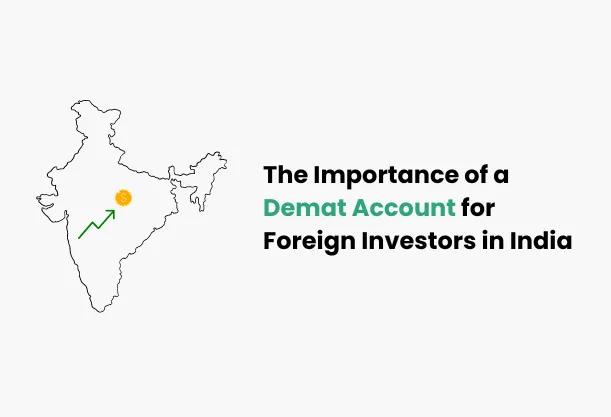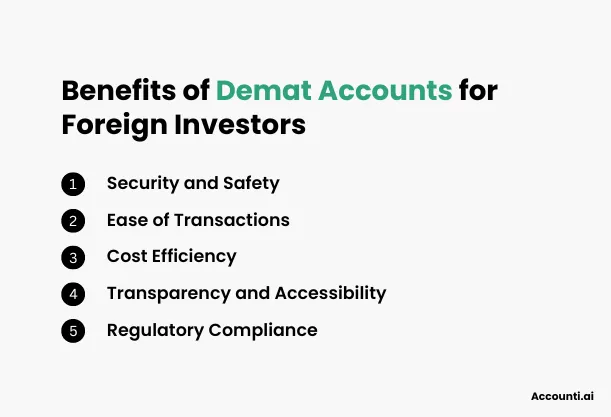
Why a Demat Account is Essential for Foreign Investors in India
Investing in India has become increasingly attractive for foreign investors, thanks to its robust economic growth and thriving stock market. However, many foreign investors still hold their investments in physical form or use outdated methods that could hinder their ability to capitalize on opportunities.
This is where Demat accounts come into play. In this article, we’ll explore why foreign investors should transition to Demat accounts in India, and how this change can benefit them significantly.
What is a Demat Account?
A Demat account, short for a Dematerialized account, allows investors to hold their securities, such as shares, bonds, and mutual funds, in an electronic format. This eliminates the need for physical share certificates and provides a seamless and secure way to manage investments.
Benefits of Demat Accounts:
- Security: Protects against theft, loss, and damage of physical certificates.
- Convenience: Simplifies the process of trading and transferring securities.
- Accessibility: Real-time access to investment portfolio and history.
In India, having a Demat account is essential for anyone who wants to invest in the stock market. This system is not only secure but also aligns with global best practices, making it crucial for foreign investors.
Current Scenario for Foreign Investors in India
Traditionally, foreign investors used physical share certificates or held securities in non-Demat forms, which posed several challenges:
- Risk of Physical Certificates: There is a constant risk of loss, theft, or damage.
- Complex Transfer Process: Transferring physical shares can be a cumbersome and time-consuming process.
- Regulatory Hurdles: Foreign investors often face regulatory complications when dealing with physical shares, making the investment process cumbersome.
These issues highlight the need for a more streamlined and secure way of investing in India’s growing market.
Benefits of Demat Accounts for Foreign Investors

1. Security and Safety
Holding securities in a Demat account eliminates the risks associated with physical certificates, such as theft, loss, or damage. This is particularly beneficial for foreign investors who may not be physically present in India to manage their investments.
2. Ease of Transactions
Demat accounts facilitate quick and hassle-free transactions. Buying, selling, and transferring securities become straightforward, allowing investors to respond rapidly to market changes. This ease of transaction can be a game-changer for foreign investors looking to maximize their returns.
3. Cost Efficiency
By moving to Demat accounts, investors can significantly reduce the costs associated with handling physical certificates, such as stamp duty, courier charges, and handling fees. This is a more cost-effective way to manage large volumes of securities.
4. Transparency and Accessibility
Demat accounts offer real-time access to your portfolio and transaction history. This transparency allows investors to make informed decisions and keep track of their investments without relying on intermediaries.
5. Regulatory Compliance
Demat accounts ensure that foreign investors comply with Indian regulatory requirements. This reduces the risk of legal complications and makes it easier for investors to focus on their investment strategies.
The Transition Process for Foreign Investors
Transitioning to a Demat account involves a few essential steps:
Step 1: Choose a Depository Participant (DP)
A Depository Participant acts as an intermediary between the investor and the depository. Foreign investors should choose a reputable DP that offers services tailored to their needs. For more information on selecting the right DP and setting up a Demat account, you can explore how foreign entities can easily open a Demat account in India.
Step 2: Submit Required Documents
Investors must provide specific documents, such as identity proof, address proof, and PAN card, along with Foreign Investment Promotion Board (FIPB) approval if required. To get a complete list of the necessary documents and understand the entire process, check out the full service Demat account setup.
Step 3: Open a Demat Account
Once the documents are verified, the DP will open a Demat account in the investor's name, enabling them to hold and manage securities electronically.
Step 4: Transfer Existing Securities
If the investor holds securities in physical form, they need to be dematerialized by submitting a Dematerialization Request Form (DRF) to the DP.
Potential Challenges in Transitioning to Demat Accounts
1. Documentation and Verification
Foreign investors may face challenges with document submission and verification due to varying regulatory requirements. It’s essential to ensure all documents are in order to avoid delays.
2. Choosing the Right DP
Selecting the right DP is crucial as it can affect the ease and cost of transactions. Investors should research and choose a DP with a good track record and robust service offerings.
3. Understanding Regulatory Compliance
Foreign investors must familiarize themselves with Indian regulations, including those set by the Reserve Bank of India (RBI) and the Securities and Exchange Board of India (SEBI).
Impact of Demat Accounts on Investment Strategies
Transitioning to a Demat account can have a profound impact on an investor's strategy. With enhanced transparency and accessibility, investors can make quicker and more informed decisions. For example, a foreign investor holding shares in a volatile sector can swiftly sell or buy shares based on market movements without worrying about the logistics of physical share certificates.
Case Study:
An international investor holding physical shares in an Indian technology company faced difficulties during a market downturn, as transferring and selling the shares involved considerable delays. After transitioning to a Demat account, the investor was able to react promptly to market changes, reducing losses and capitalizing on recovery opportunities.
Key Takeaways for Foreign Investors
- Elimination of Physical Risks: By switching to Demat accounts, foreign investors eliminate the risks associated with physical share certificates, such as theft, damage, and loss.
- Streamlined Regulatory Compliance: Demat accounts help foreign investors meet Indian regulatory requirements more effectively, reducing the risk of legal complications.
- Ease of Market Transactions: The Demat format simplifies buying, selling, and transferring shares, which is crucial for reacting swiftly to market conditions.
- Cost Reduction: Managing investments electronically reduces costs related to paperwork, courier services, and handling charges, making it more economical.
- Real-Time Access to Investments: Foreign investors can monitor their portfolios and make informed decisions with real-time access to their investments, enhancing strategic planning.
- Improved Portfolio Management: With better tracking and management tools, investors can optimize their investment strategies, balance portfolios, and assess risks efficiently.
Conclusion
Transitioning to a Demat account is not just a necessity but a strategic move for foreign investors looking to streamline their investment process in India. With the Indian market offering immense potential, Demat accounts provide the security, efficiency, and transparency needed to navigate this dynamic landscape. If you're a foreign investor aiming to make the most of India's growth story, making the switch to a Demat account should be at the top of your to-do list.
FAQs
Why is Demat account mandatory?
A Demat account is mandatory because it allows you to hold and trade shares electronically instead of using physical certificates. This reduces risks like theft or damage and makes trading easier. It’s required by the government to ensure safe and transparent transactions in the stock market.
Can a foreign citizen have a demat account in India?
Yes, a foreign citizen can open a Demat account in India. This allows them to invest in Indian stocks and securities. They need to complete some paperwork, including getting a PAN card and following KYC rules. The account can be either repatriable or non-repatriable, depending on whether they want to transfer funds back to their home country.
Is it mandatory to convert a demat account to NRI?
Yes, if you become an NRI (Non-Resident Indian), you must convert your resident Demat account to an NRI Demat account. This is required to comply with Indian regulations. You can choose between two types of accounts based on whether you want to send money outside India or keep it within the country.

 Rohit Kapoor
Rohit Kapoor

